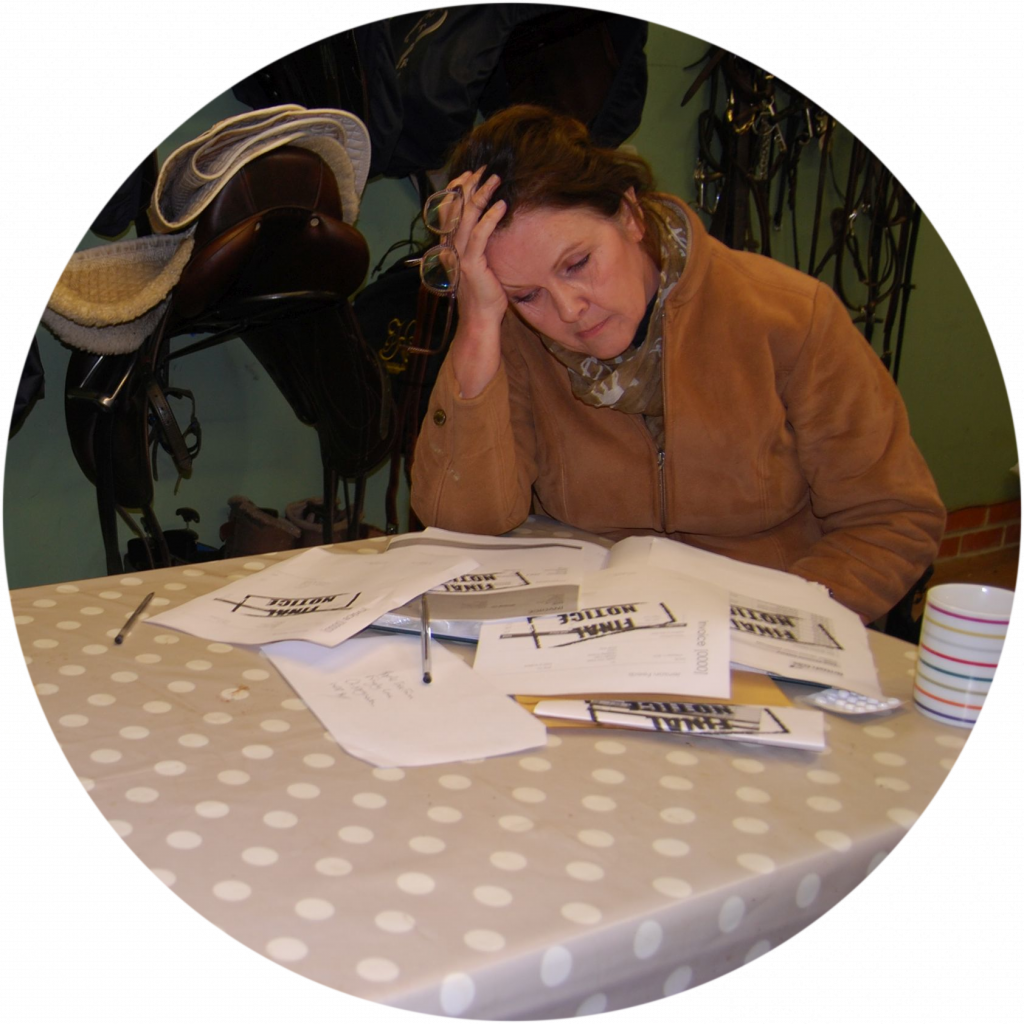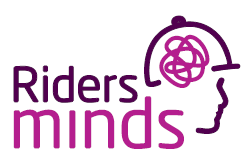
WHAT IS STRESS?
Stress is part of life, and seems increasing so in 21st century living.
Life has ‘ups and downs’ and being around horses has further ‘ups and downs’ too. We hear the words – stress, stressed out, stressful, stressy – almost daily.
Yet, what does it mean exactly?

MEANING OF STRESS
Some claim they thrive on stress yet, for others, it’s a very different experience. Does everyone get stressed? Is someone’s stress, another’s pressure? How is it experienced?
Can you relate to any of these examples?:
- Your show jumping’s not going well. You’re struggling to pinpoint why. Finding ways, ideas to return to form is becoming stressful.
- It’s very stressful being bullied.
- Stepping up a dressage level is challenging. Are you experiencing stress or pressure about learning new movements? And, what to do about it?
- You had a nasty fall. Are you stressed at Pony Club games or determined?
- You started riding lessons as you’re keen to ride for pleasure but there’s more to it than you thought! You start feeling downhearted, start comparing yourself to others and feel stressed you’re ‘not good enough’.
- Spiteful criticism you’re getting on social media is stressing you out.
- You’re a professional event rider with seven horses at one event, in different classes, riding for four very different owners. Timings are tight requiring precision, swift changeovers – boots, tack, studs etc. A good although pressurised day’s work for you, yet stressful and overwhelming for another.
- Certain situations are stressful for someone living with an ongoing condition or disability.
- You slipped at a previous team vaulting competition. You’re stressed at your next event that it might happen again, and letting the team down.
- Stressful stuff is happening in your personal life. It starts affecting you, your riding, your horse, your performance enjoyment etc etc.
- You’re a professional rider and become pregnant. Although wonderful, it’s also stressful how you’re going to manage on many levels.
- You’re stressing over you and your pony being called nasty names.

Stress can affect the mind and body in many ways, and everyone experiences stress differently.
Sometimes we may be unaware, or feel mentally OK, but our bodies tell us differently.
Plus, we can all have ‘one of those days’, although pay attention if they continue or become the norm.
Why not try the Mental Health Checker?
Exploring the Self-Help Zone, or courageous conversations might also be helpful.
WHAT DO YOU KNOW ABOUT STRESS?
Stress can affect the mind and body in many ways, and everyone experiences stress differently.
Check out these FAQs to discover more:
As a rider you’ll know all about horses’ flight responses to fear, stress or a stressful situation! When the brain perceives some kind of stress, it starts flooding the body with chemicals such as adrenaline and cortisol – the stress hormone.
This creates a variety of reactions such as increased heart rate, shortness of breath, upset tummy, sweating, tingling, muscle tension, trembling, shaking, and invisible high blood pressure all in readiness for our response.
The senses suddenly have a laser-like focus too, to alert you what to do next. Often an automatic, visceral reaction to protect you from whatever you’re finding stressful. eg. your horse spooks or naps badly, sharply refuses a jump, won’t load, your first competition, hacking a youngster alone for the first time, managing a ‘difficult’ owner, negative social media comments, running your equestrian business.
Or perhaps managing an ongoing personal crisis, or avoiding/managing physically stressful situations — arranging competition cover as you’re injured, sitting tight during bucking, preparing for a dressage test, you’ve a stressful home and/or work life.
If a person regularly feels disproportionate or excessive levels of stress, and that’ll depend on the individual, it can lead to, or contribute to poor mental health and possibly clinical mental health disorder diagnosis. Eg PTSD, depression, anxiety.
Stress can affect our physical health too which we may, or may not, be aware of. As physical and mental health co-exist, stress can affect our mental health that way too.
Good stress – which is rarely mentioned – is stress that’s beneficial and motivating.
Bad stress – the one that’s constantly mentioned – is stress that affects our ability to cope, causes anxiety and even health problems.
For one, it’s a trigger, your warning sign(s) that you need to do something, to take action.
For instance, you might notice that sometimes being ‘stressed-out’ motivates you to focus intently on getting things done, known as ‘being energised by a deadline’. eg. you’re late arriving at your competition due to traffic jams; you’re given a different horse as your normal Sunday morning hack is unavailable, you fell off last time out, so you’re more determined this time.
It can help meet daily challenges eg. the event riding order is re-scheduled and you’re in earlier than you thought; managing training plans, managing owners expectations, entering competitions before the deadline, traffic delays making you late for your lesson.
It could be an adverse or demanding situation, such as a fall, an accident, a sick or injured horse, a challenging sale of a horse, an argument, someone has a panic attack, having a ‘difficult’ conversation, a business matter.
Plus, more often than not, some sort of fear is involved. Fears around safety, getting hurt, falling off, injury or worse. Managing businesses, life, family, work/life balance.
Also, fear of failing, losing clients, losing a business, hurting others’ feelings, people laughing at us. Coming last, coming first, being good at what we do, or not good enough. When we think/feel we’re not coping, have too much to do. Not knowing how or what to do, and the unknown itself. So many things can be fearful.
How we recognise / experience bad stress is often difficult to articulate, express or describe. However, we will have a sense of it; we will feel it.
If we’re honest with ourselves, we will know often through physical and behavioural changes which is why spotting our personal clues and cues is so important. Impact on our physical health can be a clue This will also enable us to differentiate between stress and pressure.
Thoughts and self-talk such as “I can’t cope” or “I don’t know which way to turn” and sensations such as “I feel wired”, “I feel like I’m on a train going 100 mph but cannot stop or get off”, “everything is going at high speed” are clues.
Watch out too for unusually abrupt verbal responses, strong corrections, or a sharp tone of voice as these can be misconstrued by others, and by you of others.
Short periods (again, dependent on the individual and circumstances) can be manageable. e.g setbacks with a horse’s training, your weekend favourite horse is out of action, unexpected busyness gets in the way of your pleasure riding, a spike in business demands, a belligerent owner.
Too much, especially over a long period of time, can cause physiological and emotional issues. It can affect our well-being, friendships, relationships, our work, our performance and ability to manage. It can affect physical health too, which we may or may not be aware of.
There’s a fine line between all these, and we can experience more than one at any time.
eg. our horse’s first competition, getting a new horse or pony, meeting a new owner, our first riding lesson, moving from ponies to horses, being picked for the team, can be all four at once!
Or, a new term… nervouscited – where we’re nervous and excited at the same time!
However, raising your self-awareness will enable you to decipher what’s going on for you.

IS THERE ANYTHING THAT CAN BE DONE ABOUT STRESS?
Yes there is. Here are three top tips for stress prevention, avoidance, reduction, and management.
Raise your self-awareness
Pay attention to your indicators as trigger(s) for action:
- How do you know you’re stressed; how do you experience it?
- What are your indicators?
- What causes your stress? Competing, a particular horse, owner, person, movement, fence type/configuration, hacking, or certain situations? Family, friend, social, work related? Social media?
Think about it differently
Stress can be your friend! – It’s a trigger, a warning, telling you to do something.
Stress isn’t always negative. A certain level of pressure can help us prepare for actions and challenges, and ‘good’ stress can drive us to succeed, to do something different, to make changes.
Accept it’s part of life. Everyone experiences [bad] stress from time to time. Just because you might not ‘see’ it or others don’t appear to ‘show’ it, doesn’t mean they don’t experience it!
Manage it differently
This has happened, what can I do about it’ approach.
- Is a conversation needed?
- Would I like help?
- What changes/actions can you take?
Helen is an event rider. She finds dressage very stressful and forgets her test. These are her five top tips:
1. Identify and recognise your indicators – Mine are butterflies in tummy, raised heart rate, shallow breathing, feeling ‘up tight’.
2. Prepare well in advance – to avoid getting stressed in first place. Work out your preparation plan, what works for you. Mine’s being on my own for about 30 mins, being present and doing a breathing exercise. I’m in the right frame of mind then to get on board. I’ve worked out over time what warm up time each horse needs too.
3. Control the things you can – i.e yourself, your behaviour, reactions, thoughts, preparations etc etc rather than trying to control the things you can’t.
4. Focus on what you can do, what you can change. I ride every stride, and once inside the boards I’m in my bubble.
5. Breathe using the 4-4-4 technique. Breathe in to slow count of 4, hold for 4, breathe out for 4.
Josh got the ride on a prestigious dressage horse. He thought this would be easy as the horse had lots of talent and was quite straight forward. He soon started feeling stressed and lost his confidence because he didn’t realise competing with the additional responsibility would be so challenging. These are his five top tips:
1. Recognise your triggers – In my case, I felt out of my depth, anxious, and worried about letting the owner down. I didn’t sleep.
2. Manage your pressures – Make some changes. In my case, I found confidence matters section on Riders Minds. I took action, got some additional training, found a mentor and my stress levels started going down.
3. Control and choice – Put yourself back in control; decide what you need to do. Avoid getting stuck.
4. Focus on what you can do, what you can change. I shifted from losing confidence to re-gaining it.
5. ‘Take 5’. Have ‘me-time’ moments during the day. Mine’s a cup of tea!
STRESS LEADING TO BURNOUT
Stress generally comes before burnout; burnout is considered a state of emotional and physical exhaustion that develops when stress becomes prolonged and unmanaged, meaning stress is the precursor to burnout.
Generally speaking:
- Stress develops into chronic stress, and eventually, or can, cross over into burnout
- Stress makes people feel that they have too much on their plate, but burnout makes people feel depleted, like they have nothing else left to give, utterly exhausted on every level. physical, emotional, physiological, cognitive etc etc
- Stress can occur if we are unable to manage pressure – pressure comes before stress. (As an aside, many jump to being stressed, when they’re actually under pressure, but the word stress has become the default language for many)
- If we’re unable to avoid, prevent, manage stress, especially over a long period of time, burnout can occur
As Megan Lane’s testimony piece shows, burnout is a serious matter.
Read Burnout in the Equestrian Industry.


